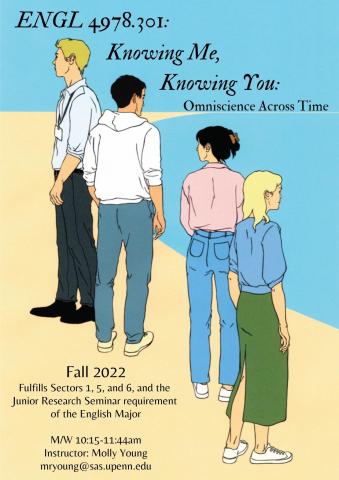JRS: Knowing Me, Knowing You: Omniscience across Time
What is the omniscient narrator? How does that mercurial figure—sometimes verging on the human, other times verging on the godly, always undefinable—inflect not only our experience of a novel, but also our understanding of how much (and how little) we ourselves can in fact know? In this course, we will analyze the omniscient narrator form from the Victorian period to our contemporary moment, testing its claims to reliability as we go. But we will also take up a few key philosophical questions that the form generates, such as: how much must a person know to properly sympathize with another? What are the essential limits to our knowledge of the world around us, of each other? How do we exist within those limits, for better or for worse?
We’ll supplement our close readings of novels with a few key texts in novel theory and philosophy. As we enter the contemporary period towards the end of the semester, we’ll devote special attention to considering how omniscient narrators have taken new shapes (or revived old ones) in the novels of the internet age—novels that represent our use of social media and search engines to increase our knowledge of each other, with an immediacy we’ve been quick to naturalize. Possible authors include Jane Austen, George Eliot, Virginia Woolf, Toni Morrison, Ali Smith, and Sally Rooney.
This course is a Junior Research Seminar, designed to familiarize students with research methods and current scholarship in the field of literary studies. Requirements include a close-reading assignment, a research paper proposal, and a research paper (10-15 pages, double-spaced).

 Department of English
Department of English
